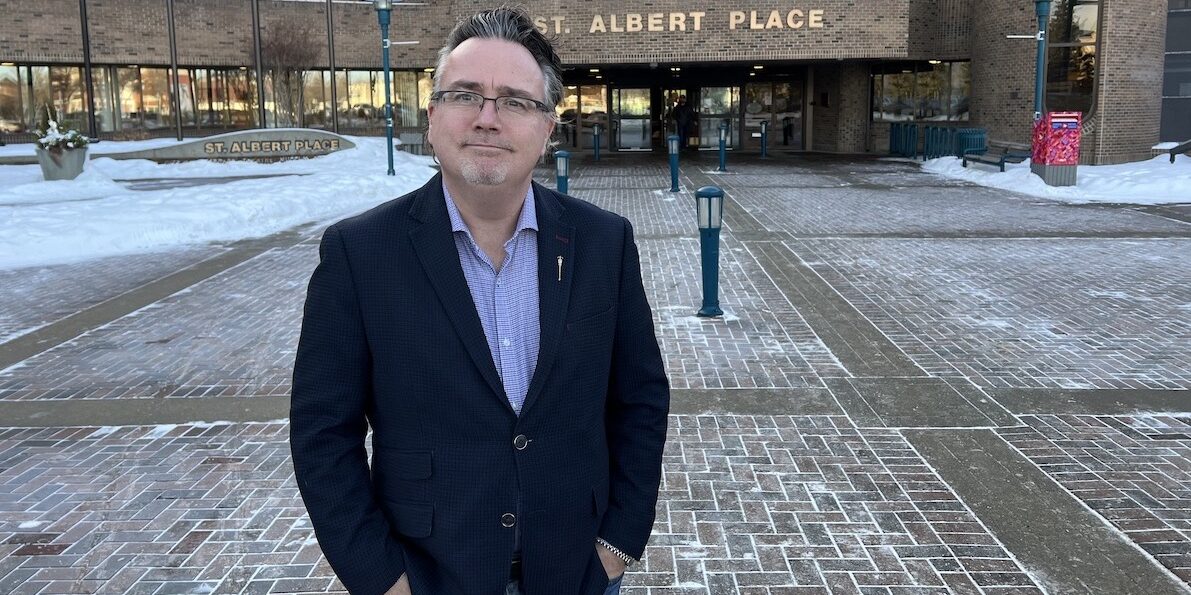The United Conservative Party (UCP) patted itself on the back for eliminating one third of the province’s red tape at a poorly staged news conference yesterday in a part of St. Albert’s Arden Theatre usually reserved for the consumption of intoxicating beverages at intermission.
Despite the self-congratulatory tone of the presser, a cute video showing UCP ministers snipping pieces of tape with a giant pair of scissors, and the impressively precise figure for the amount of red tape allegedly cut – 33 per cent! – this claim needs to be taken with the traditional grain of salt.
The principal problem is that while a couple of reporters tried to get “Red Tape Reduction Minister” Dale Nally to explain the difference between “red tape” and legitimate regulations, he dodged and weaved and failed to produce a meaningful answer.
So, how does the government define red tape? Well, whatever it is, it’s something that “often creeps up slowly, hampering ingenuity, efficiency and growth,” according to a quote in the government’s news release attributed to Premier Danielle Smith. “It hurts our economy and it hurts Albertans.”
OK, then!
“Our attitude about red tape is simple: when we find it, we cut it,” said Nally – whose real portfolio is Service Alberta, traditionally the most junior in the Alberta cabinet – in his canned news release quote. He claimed the UCP has eliminated 200,000 regulations since it came to power in 2019.
So when they find it they cut it, except when they don’t cut it, of course. What about that demand that municipalities give the province a list of federal grants and supports they receive, one cheeky reporter asked, isn’t that just more red tape?
“We have never taken the position that all regulation is bad,” Nally responded stiffly. Municipal Affairs Minister Ric McIver “has made the decision that that is something necessary that he needs to move forward with,” he explained, so it’s obviously not mere red tape.
So, has the government really eliminated 33 per cent of all regulations on Alberta’s books? Of course not.
It’s eliminated a third of the rules that the UCP would like to eliminate, apparently – which defines the difference, I guess, between a glass two thirds empty and one that’s one-third full. Or something.
The government has published a red-tape reduction annual report that makes the questionable claim $2.75 billion has been saved by these actions. There is no explanation in the report of how this figure was arrived at or proving the unlikely assertion the claimed savings, even if real, are “leading to better access to health care services and improved environmental monitoring.”
“You don’t have to take our word for it,” Nally enthused nevertheless, pointing as a performance indicator an A-minus “grade” assigned by the Canadian Federation of Independent Business, a lobby group that habitually demands lower business taxes and complains about the cost of regulations intended to protect customers and workers.
The government’s news release also mentioned similar kudos from Restaurants Canada, the organization that has never seen a minimum-wage increase it approved of.
Needless to say, bouquets from such commercial special interest groups do not indicate a government acting in the interests of working people, health and safety, or sound policy.
Alberta’s first red tape reduction minister, Grant Hunter, who acted as the emcee for yesterday’s dreary affair, even admitted that the CFIB “helped us craft this very important initiative.”
Indeed, the government has formalized this approach, with the creation of nine “industry panels,” which in effect allow many industry groups to write their own rules.
As has been said in this space before, the UCP in fact has nothing against red tape – as long as it messes with its enemies or picks a needless fights with the Trudeau Government in Ottawa.



